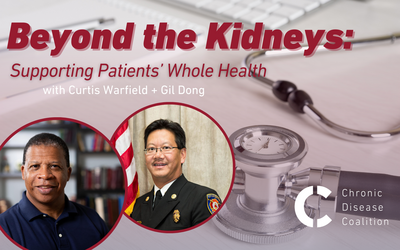
While March is National Kidney Month, the Chronic Disease Coalition works year-round to improve health outcomes for Americans living with chronic kidney disease or End Stage Renal Disease (ESRD).
We do this by advocating for increased access to dialysis treatments, encouraging states to protect living donors from insurance discrimination, and helping establish chronic kidney disease task forces to enshrine the patient perspective in the conceptual phase of policy making.
CDC Ambassador Curtis Warfield, who is a kidney transplant recipient, puts it this way:
“The importance of advocacy work helps bring more awareness to kidney disease to 1) prevent the disease in those who have a chance not to develop it; 2) educate—bring a battle mentality to those who don’t see any hope; 3) increase awareness of organ donation, especially living donation, to the general public; 4) celebrate those living donor heroes as much as those who have given posthumously and 5) help break down myths about CKD, especially in the African-American community and other communities of color and 6) to be the voice for those who are unable to be their own.”
All of these policy priorities are critical to supporting the kidney community. And with a disease like ESRD, which has whole-body impacts, it’s also important to consider how we can support kidney patients in the entirety of their health journeys.
For patients with ESRD, dialysis or a transplant are their only options. And every day, hundreds of thousands of Americans receive dialysis, and far too many are waiting for a kidney transplant. But there are public policy solutions that can help patients slow the progression of this disease, and improve their chances at qualifying for a new kidney.
We do that by increasing the resources that kidney patients have to help them with their whole health. A smart place to start is by making nutrition supplements and dental care more readily available to kidney patients.
By improving dental care for kidney patients, we can expand the opportunities for kidney patients of all backgrounds to receive a transplant, because additional health problems (beyond failing kidneys) can disqualify a patient from a transplant. While most kidney patients have insurance coverage that will pay for dental screenings, many do not have the means to remedy any problems that may be identified.
This puts low-income Americans at a disadvantage when it comes to the treatment of their ESRD and their qualifications for a transplant. By expanding access to this kind of care for the kidney community, we can level the playing field.
Because the Chronic Disease Coalition advocates on behalf of so many different and varied patient populations, we tend to focus on areas of common need that benefit all chronic conditions. Expanding access to nutrition supplements is one of those focuses, especially for the kidney community. Investment in this kind of care will greatly help kidney patients manage and potentially delay the progression of their disease.
Gil Dong, the former Fire Chief for the city of Berkley, CA, was diagnosed with lupus which spiraled into kidney disease because of environmental factors outside his control.
“I managed it well for a long time, but the combination of age and work stress really made the lupus go out of control,” he said. “My kidneys were failing, and I had to go on dialysis.”
While Gil received a transplant from his friend and fellow firefighter Peter Yung, his story is not uncommon. Kidney patients are often other disease patients first, and it’s critical to spread awareness about what can lead to this illness.
We look forward to shining a light on the issues the kidney community is facing during National Kidney Month – and working with our partners and patients around the country to advance common sense public policy solutions. Together, we can advocate for all chronic patients.